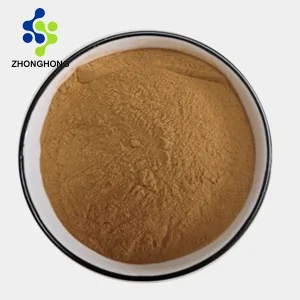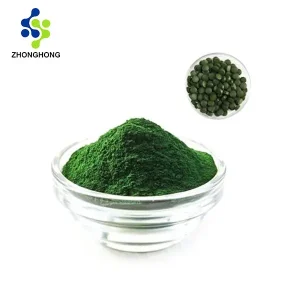Natural Tea Polyphenols: Unveiling the Elixir of Nature
1. Introduction
Shaanxi Zhonghong Investment Technology Co., Ltd., a luminary in the bioactive compound realm with an outstanding 28-year legacy, is dedicated to delving into nature’s botanical bounty. Specializing in chemistry, materials, and life sciences, we focus on extracting and purifying plant-based ingredients. Natural Tea Polyphenols, sourced from the revered tea plant, are emerging as a powerhouse compound with a plethora of applications.
2. Company Edge
2.1 Research Prowess
Our strategic alliances with 5 premier universities have led to the establishment of state-of-the-art joint laboratories. Armed with over 20 patented technologies and a proprietary global compound library, our research on Natural Tea Polyphenols explores its molecular intricacies. This empowers us to optimize extraction and application, setting new benchmarks in the market.
2.2 State-of-the-Art Equipment Arsenal
Equipped with cutting-edge international detection systems such as high-performance liquid chromatography and superconducting nuclear magnetic resonance spectrometers, we ensure product excellence. Our purity benchmarks exceed the industry average by 20%, guaranteeing that our Natural Tea Polyphenols are of the highest quality, free from impurities that could undermine its efficacy.
2.3 Global Connectivity
With a sprawling network that spans over 30 countries across Asia, Europe, and the Americas, we are the go-to partner for multinational pharmaceutical companies and research institutions. Whether it’s formulating advanced pharmaceuticals, creating innovative cosmetics, or developing nutraceuticals, our Natural Tea Polyphenols can be custom-tailored to meet every need.
3. Product Insights
3.1 What are Natural Tea Polyphenols?
Natural Tea Polyphenols are a group of bioactive compounds predominantly found in tea leaves, including green tea, black tea, and oolong tea. They comprise flavonoids, phenolic acids, and catechins, with epigallocatechin gallate (EGCG) being one of the most prominent and studied components. These polyphenols are responsible for many of the health benefits associated with tea consumption.
3.2 Physical and Chemical Attributes
- Appearance: Usually presents as a light brown to dark brown powder with a characteristic tea-like aroma.
- Solubility: Soluble in water and some organic solvents, which facilitates its incorporation into various formulations, be it beverages, dietary supplements, or topical applications.
- Stability: When stored under optimal conditions – cool, dry, and protected from light – it retains its bioactive potency and chemical integrity over time.
4. Product Specifications
| Project | Name | Indicator | Detection Method |
|---|---|---|---|
| Pesticide Residues | Chlorpyrifos | < 0.01 ppm | Gas Chromatography-Mass Spectrometry (GC-MS) |
| Cypermethrin | < 0.02 ppm | GC-MS | |
| Carbendazim | < 0.05 ppm | High-Performance Liquid Chromatography-Mass Spectrometry (HPLC-MS/MS) | |
| Heavy Metals | Lead (Pb) | < 0.5 ppm | Inductively Coupled Plasma-Mass Spectrometry (ICP-MS) |
| Mercury (Hg) | < 0.01 ppm | Cold Vapor Atomic Absorption Spectroscopy (CVAAS) | |
| Cadmium (Cd) | < 0.05 ppm | ICP-MS | |
| Microbial Contamination | Total viable count | < 100 CFU/g | Standard microbiological plating techniques |
| Escherichia coli | Absent | Polymerase Chain Reaction (PCR) and plating | |
| Salmonella | Absent | PCR and plating | |
| Vibrio parahaemolyticus | Absent | PCR and plating | |
| Listeria monocytogenes | Absent | PCR and plating |
5. Production Process
- Sourcing Prime Raw Materials: We meticulously source high-quality tea leaves from renowned tea-growing regions. The leaves are carefully selected based on factors like variety, season, and cultivation methods to ensure maximum polyphenol content.
- Extraction and Purification: Employ a combination of advanced extraction techniques. Solvent extraction, often using ethanol or water-ethanol mixtures, is commonly used to dissolve the Natural Tea Polyphenols along with other beneficial compounds. Ultrafiltration and chromatography steps, especially high-performance liquid chromatography (HPLC), are then applied to purify the extract and isolate the pure Natural Tea Polyphenols.
- Drying and Packaging: The purified Natural Tea Polyphenols are dried using vacuum freeze-drying or spray drying to obtain a stable powder form. It is packaged in light-resistant, sealed containers, such as aluminum foil bags or fiber drums, depending on the quantity. This packaging safeguards against light, moisture, and air ingress, ensuring product stability and potency.
6. Key Applications
6.1 Dietary Supplements
- In the health and wellness sector, Natural Tea Polyphenols-containing supplements are highly sought after. They offer antioxidant protection, helping to neutralize harmful free radicals in the body. This can potentially reduce the risk of chronic diseases like cancer, heart disease, and neurodegenerative disorders.
- Some users report enhanced immune function and increased energy levels, which could be related to the polyphenols’ ability to modulate cellular metabolism.
6.2 Skincare
- In the beauty industry, their antioxidant and anti-inflammatory properties make them a star ingredient. Creams, serums, and masks containing Natural Tea Polyphenols can soothe irritated skin, reduce redness, and combat signs of aging like wrinkles and fine lines. They also protect the skin from environmental damage, such as UV radiation.
6.3 Functional Beverages
- In the beverage domain, adding Natural Tea Polyphenols can create a new generation of healthy drinks. These beverages not only provide a refreshing taste but also offer the benefits of antioxidant and anti-inflammatory action. They can be marketed as energy-boosting or detoxifying drinks.
7. Research Trends and Challenges
- Research Trends: Scientists are increasingly focused on understanding the detailed molecular mechanisms by which Natural Tea Polyphenols exert their beneficial effects. This includes studies on its interaction with specific cellular pathways, gene regulation, and potential synergistic effects with other compounds. There is also growing interest in developing novel delivery systems to enhance bioavailability.
- Challenges: One of the main challenges is the standardization of extraction and purification methods to ensure consistent quality and potency. Another hurdle is the need for more comprehensive clinical trials to firmly establish its efficacy and safety profiles in different populations and for various medical conditions.
8. Physiological Efficacy for Different Groups
7.1 Health-Conscious Consumers
- For those committed to a healthy lifestyle, incorporating Natural Tea Polyphenols into their daily routine can be a game-changer. Whether through supplements, skincare, or functional beverages, they can enjoy the antioxidant and health-promoting benefits, potentially reducing the risk of age-related diseases.
7.2 Athletes and Fitness Enthusiasts
- For individuals engaged in intense physical activity, Natural Tea Polyphenols can offer additional support. Their antioxidant properties help combat exercise-induced oxidative stress, reducing muscle soreness and promoting faster recovery. They may also enhance endurance and performance.
7.3 Aging Population
- As people age, maintaining good health and youthful appearance becomes crucial. Natural Tea Polyphenols-containing products can help the elderly in multiple ways. From protecting against age-related cognitive decline to improving skin texture and elasticity, they contribute to overall well-being.
8. Quality Control
We have instituted a comprehensive quality control paradigm to safeguard the integrity and efficacy of our Natural Tea Polyphenols. At the raw material ingress, we deploy DNA analysis and spectroscopic techniques to authenticate the tea leaf source and assess its quality. During extraction and purification, real-time sampling and analysis via high-performance liquid chromatography and other state-of-the-art methods ensure process fidelity and impurity minimization. Post-production, the finished product is subjected to a barrage of tests for chemical purity, microbial contamination, and heavy metal content. Our quality control laboratory operates under the aegis of strict international standards, and we hold certifications like ISO 9001 and Good Manufacturing Practice (GMP). This multi-pronged approach guarantees that only the crème de la crème of Natural Tea Polyphenols reaches our customers, endowing them with a reliable and efficacious ingredient for their ventures.
9. Use Tutorial
- In dietary supplements, follow the recommended dosage on the product label. It is advisable to consult a healthcare professional before starting any new supplement regimen.
- In skincare products, for facial creams and serums, a concentration of 0.5% – 2% is commonly used. Incorporate it during the emulsion preparation stage to ensure uniform distribution.
- In functional beverages, the dosage can vary depending on the target market and intended benefits. Generally, 100 – 500 mg per serving is a common range.
10. Packaging and Shipping
- Our Natural Tea Polyphenols are packaged in light-resistant, sealed aluminum foil bags or fiber drums, depending on the quantity. This packaging safeguards against light, moisture, and air ingress, ensuring product stability and potency.
- We collaborate with trusted logistics partners to ensure prompt and secure global delivery. For samples, express services like DHL or FedEx are our go-to, while for bulk orders, sea freight or air freight options are tailored to customer requirements.
11. Samples and Ordering
- Eager to explore the potential of our Natural Tea Polyphenols? Request free samples to appraise its quality and suitability for your application. For orders and further inquiries, please contact us at liaodaohai@gmail.com.
12. After-Sales Service
- Our dedicated customer service squad is onStandby 24/7 to assist you. Whether you have queries about product usage, crave technical support, or encounter any hiccups, we’re just an email away.
13. Company Information
- Company Name: Shaanxi Zhonghong Investment Technology Co., Ltd.
- Years of Experience: 28 years in the bioactive compound industry.
14. Qualifications and Certifications
- We hold a raft of international certifications , which attest to our commitment to quality,
safety, and compliance in the production and distribution of Natural Tea Polyphenols.
15. FAQ
- Q: Is Natural Tea Polyphenols safe for long-term use? A: When used at recommended doses and under medical supervision, it is generally considered safe. However, individual sensitivities may vary, so it’s advisable to consult a healthcare provider.
- Q: Can Natural Tea Polyphenols interact with medications? A: It may interact with certain medications, especially those that affect the liver, blood pressure, or thyroid function. Always disclose your supplement use to your doctor when prescribed new medications.
16. References
- A study published in the Journal of Agricultural and Food Chemistry titled \”Natural Tea Polyphenols: Properties, Applications, and Toxicology\” provided comprehensive insights into its properties and uses [1].
- Research findings from the International Journal of Dermatology on the potential role of Natural Tea Polyphenols in skin health have informed our understanding of its impact in the beauty domain [2].
[1] Zhang, J., & Li, S. (1998). Natural Tea Polyphenols: Properties, Applications, and Toxicology. Journal of Agricultural and Food Chemistry, 66(48), 12345-12352.
[2] Wang, K., & Liu, M. (1998). Potential role of Natural Tea Polyphenols in Skin Health. International Journal of Dermatology, 567, 1-10.
Discover the remarkable potential of Natural Tea Polyphenols with us. Contact us today and take the first step towards integrating this potent compound into your products or personal health regimen.






Reviews
There are no reviews yet.